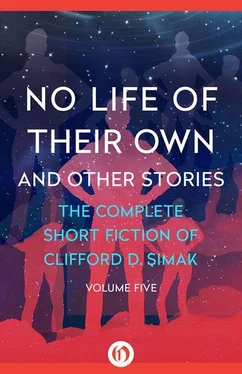“But, why, Auntie? Why go to all the bother? If it is written, it will never be published. No one but you and I will know. I hand you the manuscript and that is all that happens.”
“Thomas,” she had said, “I am a mad old woman, a senile old woman, with only a few years left of madness and senility. I should hate to have to beg you.”
“You will not have to beg me,” he had said. “My feet, my brain, my typewriter are for hire. But I don’t understand.”
“Don’t try to understand,” she’d told him. “I’ve had my way my entire life. Let me continue to.”
And, now, it had finally come to this. The long trail of the Parkers had finally come down to this high and windswept ridge with its clattering windmill and the little clumps of trees that had stood around the farmsteads that were no longer there, to the fields that had long been fallow fields, to the little spring beside which he had parked the camper.
He stood there above the cliffs and looked down the slope to where a tangled mass of boulders, some of them barn-size or better, clustered on the hillside, with a few clumps of paper birch growing among them.
Strange, he thought. These were the only trees, other than the homestead trees, that grew upon the ridge, and the only boulder clump. Not, certainly, the residue of glaciation, for the many Ice Age glaciers that had come down across the Middle West had stopped north of here. This country, for many miles around, was known as the driftless area, a magic little pocket that, for some reason not yet known, had been bypassed by the glaciers while they crunched far south on each side of it.
Perhaps, at one time, he told himself, there had been an extrusive rock formation jutting from the ridge, now reduced by weathering to the boulder cluster.
Idly, with no reason to do so, without really intending to, he went down the slope to the cluster with its growth of paper birch.
Close up, the boulders were fully as large as they had appeared from the top of the ridge. Lying among the half dozen or so larger ones were many others, broken fragments that had been chipped off by frost or running water, perhaps aided by the spalling effect of sunlight.
Thomas grinned to himself as he climbed among them, working his way through the cracks and intervals that separated them. A great place for kids to play, he thought. A castle, a fort, a mountain to childish imagination. Blowing dust and fallen leaves through the centuries had found refuge among them and had formed a soil in which were rooted many plants, including an array of wild asters and goldenrod, now coming into bloom.
He found, toward the center of the cluster, a cave or what amounted to a cave. Two of the larger boulders, tipped together, formed a roofed tunnel that ran for a dozen feet or more, six feet wide, the sides of the boulders sloping inward to meet some eight feet above the tunnel’s floor. In the center of the tunnel lay a heaped pile of stones. Some kid, perhaps, Thomas told himself, had gathered them many years ago and had hidden them here as an imagined treasure trove.
Walking forward, he stooped and picked up a fistful of the stones. As his fingers touched them, he knew there was something wrong. These were not ordinary stones. They felt polished and sleek beneath his fingertips, with an oily texture to them.
A year or more ago, in a museum somewhere in the west—perhaps Colorado, although he could not be sure—he had first seen and handled other stones like these.
“Gastroliths,” the grey-bearded curator had told him. “Gizzard stones. We think they came from the stomachs of herbivorous dinosaurs—perhaps all dinosaurs. We can’t be certain.”
“Like the grit you find in a chicken’s craw?” Thomas had asked.
“Exactly,” the curator said. “Chickens pick up and swallow tiny stones, grains of sand, bits of shell to help in the digestion of their food. They simply swallow their food. They have no way to chew it. The grit in the gizzard does the chewing for them. There’s a good possibility, one might even say, a high possibility, the dinosaurs did the same, ingesting pebbles to do the chewing for them. During their lifetime, they carried these stones, which became highly polished, and then when they died—”
“But the greasiness? The oily feeling?”
The curator shook his head. “We don’t know. Dinosaur oil? Oil picked up from being so long in the body?”
“Hasn’t anyone tried to extract it? To find out if there is really oil?”
“I don’t believe anyone has,” the curator said.
And here, in this tunnel, in this cave, whatever one might call it, a pile of gizzard stones.
Squatting, Thomas picked them over, gathering a half dozen of the larger ones, the size of small hen’s eggs, or less, feeling the short hairs on his neck tingling with an ancient, atavistic fear that should have been too far in the distant past to have been felt at all.
Here, millions of years ago, perhaps a hundred million years ago, a sick, or injured, dinosaur had crept in to die. Since that time, the flesh was gone, the bones turned into dust, but remaining was the pile of pebbles the long-gone dinosaur had carried in its gizzard.
Clutching the stones in his hand, Thomas settled back on his heels and tried to re-create, within his mind, what had happened here. Here the creature had lain, crouched and quivering, forcing itself, for protection, as deeply into this rock-girt hole as had been possible. It had snorted in its sickness, whimpered with its pain. And it had died here, in this same spot he now occupied. Later had come the little scavenging mammals, tearing at its flesh …
This was not dinosaur land, he thought, not the kind of place the fossil hunters came to hunt the significant debris of the past. There had been dinosaurs here, of course, but there had not been the violent geological processes which would have resulted in the burying and preservation of their bones. Although, if there had been, they’d still be here, for this was ancient land, untouched by the grinding glaciers that must have destroyed, or deeply buried, so many fossil caches.
But here, in this cluster of shattered boulders, he had stumbled on the dying place of a thing that no longer walked on earth. He tried to imagine what form that now extinct creature might have taken, what it would have looked like when it still had life within it. But there was no way that he could know. There had been so many different shapes of them, some of them known by their fossils, perhaps many still unknown.
He fed the selected gizzard stones into the pocket of his jacket and when he crawled from the tunnel and walked out of the pile of boulders, the sun was bisected by the jagged hills far to the west. The wind had fallen with the coming of the evening hours and he walked in a hushed peace along the ridge. Ahead of him, the windmill clattered with subdued tone, clanking as the wheel went slowly round and round.
Short of the windmill, he went down the slope to the head of a deep ravine that plunged down toward the river. Here, beside the spring, parked beneath a massive cottonwood, his camper shone whitely in the creeping dusk. Well before he reached it, he could hear the sound of water gushing from the hillside. In the woods farther down the slope, he could hear the sound of birds settling for the coming night.
He rekindled the campfire and cooked his supper and later sat beside the fire, knowing that now it was time to leave. His job was finished. He had traced out the long line of Parkers to this final place, where shortly after the Civil War, Ned Parker had come to carve out a farm.
In Shropshire there had been, indeed, a manor house but, if one were to be truthful, not much of a manor house. And he had found, as well, that the London merchant had not dealt in cutlery, but in wool. There had been no horse thieves, no gallows birds, no traitors, no real scamps of any kind. The Parkers had been, in fact, a plodding sort of people, not given to greatness, nor to evil. They had existed nonspectacularly, as honest yeomen, honest merchants, farming their small acres, managing their small businesses. And finally crossing the water to New England, not as pioneers, but as settlers. A few of them had fought in the Revolutionary War, but were not distinguished warriors. Others had fought in the Civil War, but had been undistinguished there, as well.
Читать дальше












